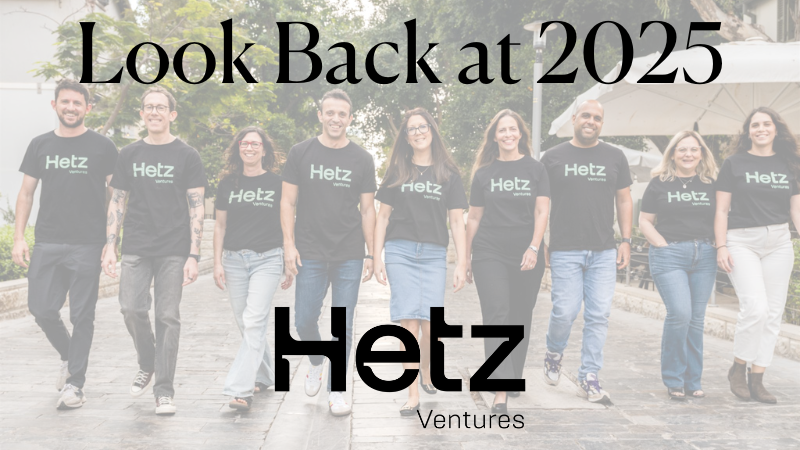Why We're Focused on Surging Demand for Climate Tech Solutions Among Forbes 2000 Companies

By now, anyone paying attention to climate change recognizes the famous “2℃” metric, but what does it really mean? Maybe you experienced the apocalyptic orange skies of New York City this past month; Or maybe you find yourself wondering, year after year - is this summer especially hot?
At Hetz Ventures we’re definitely feeling the heat: For the better part of a year, we’ve been examining the climate tech sector in Israel and globally. In Q1 2023 we started building our investment thesis and made our first seed investment in a company working on a new offset method.
We’re no strangers to the fact that since the ‘cleantech bust’ of the late 2010s, the Israeli tech scene has cooled off on building climate tech companies. But we’ve come to the conclusion that there is a fitting way to approach investing in Israeli climate tech today, and there’s a climb happening on local ground, with more professionals coming up from the military or corporate backgrounds ready to delve in.
One way we approach the climate tech sector, much like we do with cybersecurity companies, is to consider the market demand. This has led us into deep research with Fortune 2000 companies, from the Hetz Executive Network and beyond, to understand what Chief Sustainability Officers are looking for, how committed corporations are to their sustainability goals, and which types of climate startups can fit into this puzzle.
With 71% of all greenhouse gas emissions coming from the top 100 fossil fuel companies, it is clear that businesses will have to play a large role in this process, and they’ve already begun. The tech industry also has a major role to play in leading the world toward carbon neutrality. A recent study analyzing the biggest tech firms found that the “Big Five” produced over 13 million Metric tons of CO2e in 2021 (more than Panama).
Motivated by cost and risk reduction, investor preferences, and government pressures, corporate sustainability spending will reach $158 billion by 2025. As companies continue to advance sustainability strategies to achieve Net Zero, demand for better, faster, cheaper climate technology products will only continue to grow.

Tracking the Way to Zero
Reducing to zero doesn’t mean a complete withdrawal from fossil fuels. Instead, Net Zero implies that for every ton of GHGs that we emit into the atmosphere, we must find a way to remove them. With the UN having set 2050 as the year to reach net zero, change from the bottom up, top-down, left-right, and every other direction will be required. This is where initiatives such as Net Zero Tracker come in. Working with various institutes and data companies, the database keeps track of the net-zero progression of all Paris Climate Agreement countries, populous cities, and the 2000 largest businesses. The website provides live information on net zero target status, scopes of coverages, and other important parameters.
Tracking and including the Global 2000 - an annual ranking published by Forbes Magazine of the largest companies ranked by sales, profits, assets, and market value - is essential. In 2023 the Global 2000 amalgamated $231 trillion in assets. The power of these corporations cannot be overstated. In just over two years, the number of these companies with net zero targets has risen by 123%, from 417 to 929.
Honeywell’s Environmental Sustainability Index, which sampled over 700 global leaders, found that 75% ranked environmental goals as their top initiative. Honeywell divides companies' progress into either process or technology driven change. The former involves modifying business behaviors (market entry, policy adjustment) the latter upgrading or replacing existing technologies. Their report finds that Q2 2023 saw an increase in tech-driven solutions across all categories.
Of the Global 2000, 17% plan on reaching their goal before 2030, 25% before 2050, and 57% by 2050. Reaching these targets will be incredibly difficult, but more and more actors are proving that behind their pledges stand real action and investment.
What’s Driving Demand?
Corporations worldwide are recognizing the urgency of climate change, but those skeptical of purely altruistic motivations may be onto something. For one, the idea that sustainability and profit are mutually exclusive is a misconception. Study after study after study has proven that the incorporation of ESG goals into company frameworks leads to positive company growth. Why? Cost reduction, government pressure, risks mitigations, as well as customer and investor preference.
- Interviews with executives at global institutional firms, including BlackRock and Vanguard, demonstrate that investing in sustainable companies is now a top priority. CEO of State Street Global Advisors shares that “ESG issues have become much more important for us as long-term investors.”

- Prices for raw materials, water, and carbon are on the rise. By converting 20% of its fleet into electric or hybrid vehicles, Fed-Ex is saving on more than 50 million gallons of gas. Correctly executing ESG targets can affect operating profits by as much as 60%, according to research by McKinsey.
- The Inflation Reduction Act of 2022 passed in the US is providing an astounding $216 billion worth of tax credits to businesses to incentivize investments in renewable energy. The updated regulations will permit companies to offset a maximum of 75% of their federal income tax liability. Other countries are bound to follow to preserve investment in national ventures. 19 countries have already implemented a “Green Tax” which is levied on environment-harming activities.

- In 2022, 34% of UK adults claimed to have stopped purchasing from certain brands because of sustainability-related concerns. This was a 6% increase from 2021. Significantly, 52% claimed that high prices were the number one reason to not implement environmentally conscious choices.
Where’s The Money Going?
The Clean200, a list of companies at the forefront of tackling climate change, reported that the businesses made $2.4 trillion in sustainable revenue in 2022 alone. The index outperformed the MSCI ACWI by nearly four percent, with the utilities and industrials sector leading the way in sustainable investments with $50 billion each.


Apple, which topped the list, allocated $706.5 million worth of green bonds to various energy sectors. Their sustainability strategy focuses on becoming entirely carbon neutral by 2030, advancing renewable resources, and implementing chemical innovations. To reduce the 22% of its carbon footprint resulting from consumer electricity usage for product charging, the company has started building a 320-megawatt solar facility. Another project has revolutionized the traditional aluminum smelting process by creating oxygen instead of GHGs. Most of Apple’s funding is going towards mitigating rather than offsetting their emissions.
Microsoft has pledged to become carbon negative by 2030. As they progress towards this goal, the tech giant removed 1.4M metric tons of CO2 and researched progressing Carbon Capture and Storage (CCS) technologies. Their $1 billion Climate Innovation Fund, founded in 2019, has backed 28 companies. The most recent investment was SustainCERT, a platform that verifies carbon credit quality and company emissions.
More broadly, corporate investment in cleantech is focused on renewable energy, electric transport, and green hydrogen. Their budgets will increasingly go towards innovative technologies that reduce and remove emissions, as well as mitigation and reporting solutions.
- Clean energy procurement is crucial for decarbonization. Power purchase agreements (PPAs) enable companies to contract renewable energy from generators, eliminating the need to build their own facilities. Global corporate PPA volumes have steadily increased, up to 37GW in 2022 (or 30 million American households).
- Multinational coalition EV100, which promotes electric vehicle adoption, consists of 127 companies including Goldman Sachs, Bank of America, and Unilever. Members have made commitments to acquire approximately 5.75 million electric vehicles and establish 6,443 distinct charging stations.
- Hydrogen fuel cells generate electricity without pollutants. Corporations are increasingly entering the space, with Amazon signing on to purchase $2.1 billion worth of hydrogen contracts from Plug Power.
The battle has only begun
Our broader investment methodology compels us to approach this opportunity from a classic venture capital perspective, which is to understand the perspective of the ideal customer. This approach, we believe, is particularly suited to investing in climate tech, given its emerging status and the global (and corporate) impetus towards climate action.
The International Energy Agency predicts that the technology required to reduce half the carbon emissions by 2050 is still in the R&D stage. To reach the pledged net zero goals, investment into both rapid deployments of existing and the development of new technologies will have to occur. As fossil fuels are phased out, electricity will account for 70% of the total energy supply (up from 20% today); An improved electric grid will be vital to facilitating this transformation. By 2050, up to a third of GHG emissions will be dealt with through Carbon Dioxide Removal, whose market is currently small and not evolving fast enough.
Luckily, a global understanding of climate urgency is present. Seed funding grew 23% in H1’23 compared with H1’22, and Seed deal count increased 34% during the same period. With the majority of companies pledging to increase their budget spending on sustainable solutions, the money is there. The ambitious goals set out by the world will require an all-hands-on-deck approach.
And so, Hetz Ventures is investing in climate tech. Whether you are currently building or thinking about starting a venture to solve for, measure or prevent the effects of climate change, we are excited to connect with you. Contact Yael Barsheshet.
Thanks to Eva Spektorov for her research and contributions to this article.
Cover photo by Anthony Quintano


.jpg)